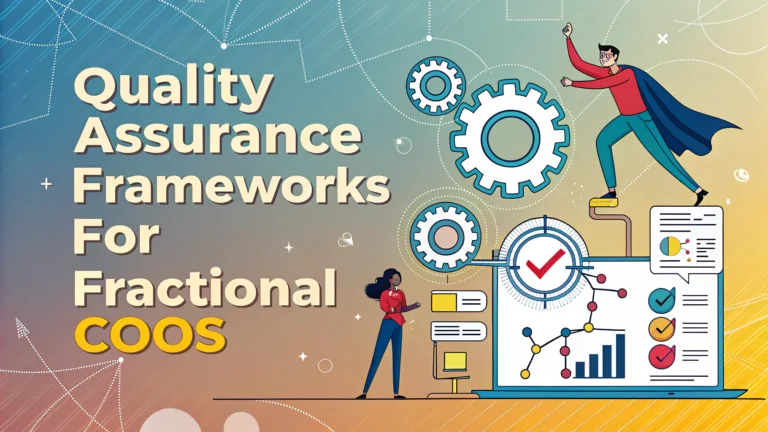Quality assurance is essential for fractional COOs to maintain consistent performance and deliver reliable results across multiple client engagements.
A well-structured QA framework helps part-time executives standardize their approach, minimize risks, and ensure they meet client expectations consistently.
This guide outlines practical quality assurance frameworks specifically designed for fractional COO services, helping you implement systems that scale.
Core Components of a Fractional COO QA Framework
- Standard operating procedures (SOPs)
- Performance metrics and KPIs
- Client feedback mechanisms
- Documentation requirements
- Risk management protocols
Establishing Clear Service Standards
Each client engagement should start with a detailed service level agreement (SLA) that outlines specific deliverables, timelines, and quality standards.
- Define scope of services
- Set measurable objectives
- Establish communication protocols
- Document reporting requirements
Implementation Checklist
| Phase | Action Items |
|---|---|
| Initial Assessment | Client needs analysis, baseline metrics, gap analysis |
| Planning | Strategy development, resource allocation, timeline creation |
| Execution | Process implementation, team training, monitoring systems |
| Review | Performance evaluation, feedback collection, improvements |
Performance Measurement Tools
Regular performance tracking helps maintain quality standards and identify areas for improvement.
- Project management software (Monday.com, Asana, Trello)
- Business intelligence tools (Tableau, Power BI)
- Customer feedback platforms (SurveyMonkey, Typeform)
- Time tracking systems (Harvest, Toggl)
Risk Management Protocols
Implement these risk management strategies to maintain service quality:
- Regular audit schedules
- Backup systems and contingency plans
- Data security measures
- Compliance monitoring
- Insurance coverage review
Documentation Best Practices
Maintain detailed records of all client interactions and deliverables:
- Meeting minutes and action items
- Project milestones and updates
- Change requests and approvals
- Performance reports
- Issue resolution logs
Client Communication Framework
- Weekly status updates
- Monthly performance reviews
- Quarterly strategy sessions
- Annual service evaluations
Continuous Improvement Strategy
Implement these steps to continuously enhance your QA framework:
- Regular framework audits
- Client feedback integration
- Industry best practice updates
- Team training and development
- Technology assessment and upgrades
Moving Forward with Quality Excellence
Regular review and updates of your QA framework ensure sustainable growth and client satisfaction.
Connect with professional organizations like the International Association of Fractional Executives (website: iafx.org) for additional resources and networking opportunities.
Schedule a quarterly review of your QA framework to maintain its effectiveness and adapt to changing business needs.
Quality Metrics Dashboard
Develop a comprehensive dashboard to track key performance indicators:
- Client satisfaction scores
- Project completion rates
- Response time metrics
- Budget adherence
- Resource utilization
Team Collaboration Tools
Essential Platforms
- Video conferencing (Zoom, Teams)
- Document sharing (Google Workspace, SharePoint)
- Communication tools (Slack, Microsoft Teams)
- Project visualization (Miro, Lucidchart)
Client Onboarding Excellence
Streamline the client integration process with:
- Welcome package templates
- Expectations documentation
- Process maps and workflows
- Team introduction protocols
- Initial assessment frameworks
Quality Control Checkpoints
| Stage | Quality Check |
|---|---|
| Pre-engagement | Client fit assessment, resource availability |
| Implementation | Milestone verification, deliverable review |
| Ongoing Service | Performance monitoring, satisfaction surveys |
| Service Completion | Final review, handover documentation |
Elevating Your Fractional COO Practice
Implement these quality assurance frameworks to establish a reputation for excellence and build long-term client relationships. Regular assessment and refinement of these systems will ensure sustainable growth and consistent service delivery.
Remember that quality assurance is not a destination but a journey of continuous improvement and adaptation to evolving business needs.
Stay connected with industry peers and maintain active memberships in professional organizations to stay current with best practices and emerging trends in fractional executive services.
FAQs
- What is a Quality Assurance Framework for Fractional COOs?
A Quality Assurance Framework for Fractional COOs is a structured system that ensures consistent delivery of operational excellence while working part-time across multiple organizations. It includes standard operating procedures, performance metrics, and accountability measures. - How do Fractional COOs implement quality control measures across different organizations?
Fractional COOs implement quality control through standardized assessment tools, documented processes, regular audits, KPI tracking, and customized dashboards for each client organization while maintaining consistent quality standards across all engagements. - What are the essential components of a QA Framework for Fractional COO services?
Essential components include operational audit templates, performance measurement systems, risk management protocols, documentation standards, communication frameworks, compliance checklists, and continuous improvement mechanisms. - How do Fractional COOs ensure consistency when working with multiple clients?
They maintain consistency through documented methodologies, standardized reporting templates, project management tools, regular review cycles, and established communication protocols specific to each client while following core quality principles. - What metrics are typically included in a Fractional COO’s quality framework?
Common metrics include operational efficiency ratios, process compliance rates, project completion times, cost reduction achievements, team productivity measures, customer satisfaction scores, and strategic initiative success rates. - How often should quality assessments be conducted by Fractional COOs?
Quality assessments should be conducted monthly for operational metrics, quarterly for strategic initiatives, and annually for comprehensive organizational reviews, with continuous monitoring of critical processes. - What role does technology play in QA frameworks for Fractional COOs?
Technology enables automated monitoring, data collection, real-time reporting, process automation, collaboration tools, and integrated management systems that support quality assurance across multiple client organizations. - How do Fractional COOs handle quality issues across different industry sectors?
They adapt core quality principles to specific industry requirements, maintain sector-specific compliance standards, and develop customized quality frameworks while leveraging best practices from various industries. - What documentation is essential for a Fractional COO’s quality framework?
Essential documentation includes standard operating procedures, quality manuals, audit reports, performance scorecards, improvement action plans, client-specific protocols, and compliance documentation. - How can organizations measure the effectiveness of a Fractional COO’s quality framework?
Organizations can measure effectiveness through improved operational efficiency, reduced costs, enhanced process compliance, better team performance, increased customer satisfaction, and achievement of strategic objectives.







